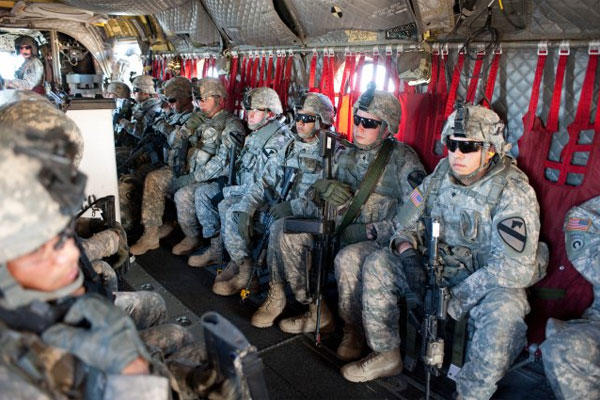The chief of staff of the Army is considering assigning active units to the National Guard to beef up readiness for short-notice deployments.
As the potential for a ground war against the Islamic State grows, Gen. Mark Milley has begun to look for ways to increase readiness of the Guard.
The Army's current strategy of reducing the active force from 490,000 to 450,000 by 2018 is forcing leaders to depend on the National Guard to help sustain a protracted contingency mission such as ground campaign against the Islamic State of Iraq and Syria, or ISIS.
Milley is looking using "round-out" units, a concept the service has used in the past that involved assigning Guard units to fill out active-component force packages.
"We are exploring round-out brigades, but not only with the National Guard rounding out the active component, but I am also taking a hard look at active component units rounding out the Guard," Milley said at a recent National Security Forum sponsored by the Center for a New American Security.
"I don't have any problem with an active unit, a battalion or a brigade, say being part of the 28th division Pennsylvania National Guard, and they wear that patch," he said.
Currently, it takes about 120 days for a Guard unit to be ready for deployment after it is alerted and mobilized, Milley said.
"The whole intent is to increase readiness and reduce response time," he said.
Besides getting smaller, the active force has 50,000 soldiers who are non-deployable for medical, legal, or other administrative reasons, according to Sgt. Maj. of the Army Daniel Dailey in November.
This means that the active force could become over-burdened rather quickly if President Obama gives into mounting political pressure to launch a ground war against ISIS forces occupying parts of Iraq and Syria.
Milley also talked about doubling the number of required annual training days for some National Guard units as a way of reinforcing the service's shrinking active force.
Currently, Guard units are required to train 39 days per year, Milley said.
Milley has been in discussions with Army Lt. Gen. Timothy Kadavy, the director for the Army National Guard, and said the plan could involve "significantly" increasing the number training days to possibly "60 to 100 days a year" to reduce the response time when Guard units get mobilized, he said.
-- Matthew Cox can be reached at matthew.cox@military.com.




























